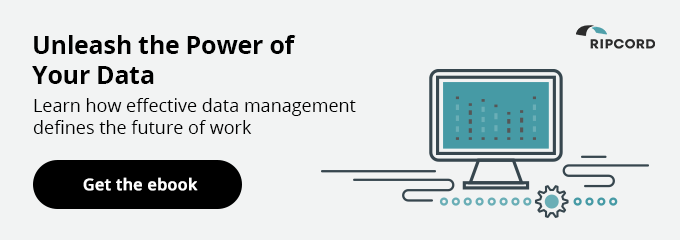
5 Ways Going Paperless Reduces Risk for Your Firm
Increasingly, the world revolves around data. The legal industry represents one of the sectors most principally tasked with managing vast amounts of data. Still, many firms continue to rely heavily on antiquated paper-based record keeping.
This is perhaps unsurprising given that few industries are as bound by tradition as the legal profession. Depending on paper is a liability in the modern world. Risk is needlessly inflated by the inherently greater likelihood of a security breach or data disaster damaging valuable information.
To mitigate risk, many firms are moving to reduce or eliminate their reliance on paper-based records. Here are five ways digitization eliminates paper-related risk.
1. Disaster Recovery
Paper is weak. In the face of a natural disaster of any kind, paper is liable to be irreparably damaged. Analog databases are acutely vulnerable, since paper is acutely susceptible to damage by fire, water, or even simple exposure to the elements. Most filing cabinets are neither fireproof nor watertight. In most cases, you wouldn’t want them to be — some ventilation is needed to prevent humidity build-up that can lead to mold. The consequence is that your paper records — and those of your clients — are easily destroyed by any natural disaster.
Backing records up on hard drives is a step in the right direction, but isn’t an adequate substitute for managing records digitally. For example, a Baltimore law firm kept its records on a hard drive which was removed from the office nightly as a precautionary measure against floods and fires. In 2011, the drive, which held critical case information and medical records of 161 people, was lost. Situations like this are unsettlingly common and shed light on a universal need for a higher standard of information safeguarding.
Modern disaster recovery protocols use cloud-based records management (RM) to ensure that data is secured and backed up redundantly so that firms can quickly and thoroughly recover from a disaster. This way, no matter what natural calamities may occur, one’s information is never at risk.
2. Data Security
While the legal industry has largely been spared from headline-generating data breaches, some firms are at risk as a function of their work with high-profile clients. Traditional methods of storing paper records — file rooms and third-party facilities — are not enough. For example, a thief needs only to pick a lock, steal a key, or copy a vendor’s security card to gain access. That’s before considering simple mistakes or oversights by authorized employees who might unintentionally compromise your records’ physical security.
Storing records in a cloud-based records management platform is a safer way to ensure your data’s security. Records are encrypted both in transit and at rest, sensitive records can be individually password-protected, and access can be restricted to your corporate network, by role and user. Data breaches concerning digital records are easier to detect, and administrators can be quickly notified to take appropriate actions.
3. Improved Organizational Efficiency
Studies show that paper-based record-keeping invites waste and inefficiency. The average organization spends around $20 in labor costs to file a single paper document, $120 to track down each misfiled document, and $220 every time a document needs to be recreated. In paper-heavy industries, it’s estimated that a typical enterprise with more than 1,000 employees wastes nearly $4 million per year searching for lost information.
Efficiency is a top priority for any business, especially in the legal business where billable hours are a main source of revenue. While a digital database can be organized for efficient searching and processing, paper records are often mislabeled, misplaced, or lost. Even when they’re properly marked and stored, they still might be spread across multiple boxes or storage locations, needlessly complicating retrieval.
Going paperless enables firms to quickly retrieve records and improve productivity leading to more billable time.
4. Protecting Records from the Real World
Vast stores of the world’s intellectual wealth have been lost over the years because of paper’s limitations as a medium for information storage. Time eventually makes paper brittle or difficult to read, ink can bleed, mold can develop, and even relatively mild shifts in atmospheric conditions can degrade paper over time. To protect against such damage, records are often stored in climate-controlled environments, which require significant investments of time and money to build and maintain.
Records don’t age the same way in the cloud. They are kept for as long as necessary and remain pristine from the day they are scanned. Delicate, older records are preserved in their current state as well, and no longer have an impending expiration date. Permanently deleting records is as simple or complex as you’d like: you can make sure that the right people approve deletion. All in all, taking advantage of the cloud ensures information safety, indefinitely.
5. Improved Compliance and Audit Trails
As corporate clients adjust to ever-stricter requirements for auditing and regulatory compliance, they begin to demand the same high-level digital safeguards as their partners. Being able to prove who came in contact with a record at each stage of its lifecycle is critical. Unfortunately, with paper records, the chain of custody is difficult to track. If the chain of custody cannot be demonstrated and proven, the validity of a document may be called into question.
People who are in contact with records may include individuals who transport the records, the workers who prep and scan, or third parties tasked with locating records when a customer requests retrieval. Digitizing and storing your records in a cloud-based platform enables you to automate compliance checks and provide complete audit trails.
/Ripcord%20Logo%20-%20Color%2011.png?width=2000&height=620&name=Ripcord%20Logo%20-%20Color%2011.png)


%20What%20It%20Is%20and%20Why%20It%20Matters%20-%20Ripcord.jpg?quality=high&width=596&name=Unlocking%20the%20Power%20of%20Robotic%20Process%20Automation%20(RPA)%20What%20It%20Is%20and%20Why%20It%20Matters%20-%20Ripcord.jpg)
.jpg?quality=high&width=596&name=Revolutionizing%20P%26C%20Insurance%20The%20Power%20of%20Intelligent%20Document%20Processing%20and%20AI%20-%20Ripcord%20(1).jpg)
.png?quality=high&width=596&name=Five%20Best%20Practices%20for%20RPA%20Implementation%20-%20Ripcord%20(1).png)